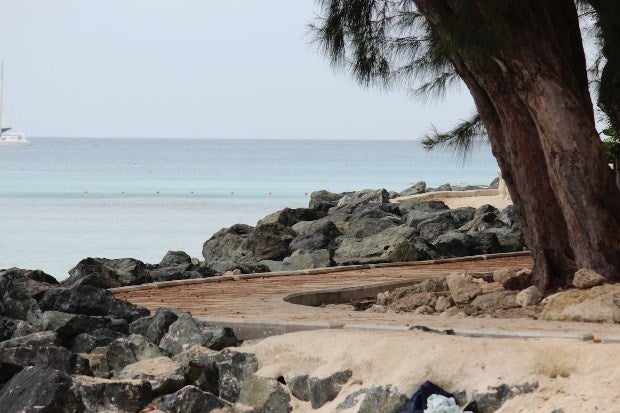Barbados is said to be a smile wide. This smile has gotten broader for locals, business owners, tourists and other visitors to the West Coast of the island following the completion of the second phase of the Inter-American Development Bank (IDB)/ Coastal Zone Management Unit (CZMU) funded coastal resilience project.
The project is designed to:
- Make the shoreline more resilient to storm waves (hurricanes and winter swell events)
- Reduce beach erosion, stabilize beaches and increase beach width
- Improve public lateral access to beaches,
- Provide new habitat for corals and fishes, that are critical for sand production
Folkestone Marine Park and Museum, was established in 1981. It covers 11% of the West Coast of Barbados (2.1 Km2). Folkestone’s marine biodiversity includes:
- Fringing reefs, patch reefs, offshore bank
- Nesting hawksbill turtles
- Foraging green turtles
- Holetown lagoon
Manager of Folkestone, John Nicholls said that the coastal resilience project was a welcomed intervention for the Park. “Before the boardwalk and groynes were constructed last year we had started to lose a lot of our visitors to the Park because the beach was completely eroded at different periods during the year and was difficult to traverse. We had to build steps to access the sea, but this was difficult for older persons and persons in wheelchairs. With the new boardwalk, the sand has returned, and we now have beautiful sandy beaches all year long.”
Smile 2. New Area For Exercise and Recreation and Ease of Public Access
Boat Operator with the Folkestone Marine Park, Carlos Gilkes said “the Marine Park stretches from Sandy Lane, South to Heron Bay, North and there is now complete access along this stretch of beach due to the boardwalks. We have seen for the first time a number of persons walking and running along the stretch regularly, especially on evenings. The new headland in Holetown has also become a favourite liming spot (hang out) as persons take the opportunity to sit on the benches provided.”
The activities in the sea have also been enhanced with the two (ship)wrecks, which are home to thousands of fish. Gilkes said that overall the development has sparked new life into the Park.
Smile 3. Facilitates Business
Glass bottom boat owner, Monica Cumberbatch and her Captain Kenrick Marshall certainly agrees with Gilkes. Cumberbatch said that she had to move her business further down the beach because of the erosion, but has been able to move back to the Park, her preferred location, now that the shoreline protection project has been completed. The glass bottom boat takes visitors snorkeling and swimming with the turtles and the thousands of fish in the Marine Park. “ We get most of our bookings online, but we like the atmosphere here at the Park because it has a lot of facilities for our customers so we are very happy with the project. It has made it easy for customers to access the boat anytime of the year. The fish are also very happy. I see some really big chubs (local fish) come on to the rocks and just play and tumble over on the rocks. It has been very good for the area and business,” said Cumberbatch.
Smile 4. Visitors to Barbados are Pleased
Brenda Cooper of Birmingham England said that she has been to the island eight times on vacation. “This is my second time going on the glass bottom boat, last year when I came the project was ongoing and I could see all the damage from the erosion, this year it is just beautiful. I love Barbados, and this project has made coming to Folkestone an even more lovely experience. Cooper loves the island so much that she has tattooed a butterfly with the Barbados flag on her back. She explained, “B is for Brenda, Butterfly and for Beautiful Barbados.”
About the Shoreline Project
The shoreline protection project forms part of a broader IDB-financed investment program (the Coastal Risk Assessment and Management Program (CRMP)), designed to build resilience to coastal hazards including those related to climate change, through enhanced conservation and management of the coastal zone. The Program focuses on coastal risk assessment, monitoring and management, hazard-resilient coastal infrastructure including pilot ecosystem-based adaptation measures; and institutional sustainability. The CRMP is being implemented by the Coastal Zone Management Unit of the Ministry of Environment and Drainage. It represents the most recent intervention in the more than 30 years of collaboration between the IDB and the Government of Barbados in innovative coastal management.






Leave a Reply